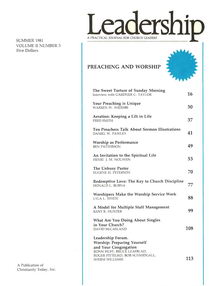Collecting sermon illustrations is only half the battle. The other half is storing them under appropriate headings so they can be easily retrieved. Here are three systems of information management that represent different approaches to the problem.
The New Baker’s Textual and Topical Filing System sells for $29.95 (Baker Book House, Grand Rapids). This is an indirect filing system which is becoming more widely accepted than direct filing (i.e. “filing alphabetically by words”). The system contains three sections in one volume: a) a topical index, b) a textual index, and c) reference spaces which contain lines for filling in information.
The topical index has just about every topic listed alphabetically that a preacher would need. The tricky part is handling synonyms. I looked up “broadcasting” in the topical index to file an article the day I bought the system. “Broadcasting” was not listed, so I wrote it in (there are generous white spaces before each printed topic for writing in your own). Later, I found the topic “Radio and Television” was listed, and I had inadvertently filed material under both topics.
The textual index follows the topical. Baker has divided the Bible into chapters, and each chapter is treated as an individual topic, receiving its own reference space. All material dealing with that chapter is filed together and is separated by verses on the reference lines in the reference space.
Don Sharp developed his Sermon File-A-Fact System on the basis of his many years in the preaching ministry. It sells for $39.50 and is available in religious book stores, or from his company, Creative Pastoral Services of Waynetown, Indiana. This system would best fit the needs of preachers who plan their sermons weeks and months in advance and then keep an eye out for material relating to what they will be preaching.
The system comes with a sermon work pad and 100 sermon/lesson worksheets. The pad stays on the preacher’s desk and is used to write down ideas that come to him from his meditation, reading, and study. The worksheets are then filed in one of thirty folders under four major headings: God, Kingdom, Man, and World. In case of doubt, the system also includes an exhaustive list of subjects to help the preacher file his worksheet, clippings, and notes in a specific folder.
The system also contains a year’s supply of sermon portfolios for the completed sermon or lesson. These portfolios are printed with spaces to record the sermon’s title, subject, date, place of delivery, and any results he finds pertinent. These completed sermons are to be placed behind one of the subject folders so new material can be added, and the sermon can be found and preached again with updated information.
One major strength of this system is that by simply looking in the file drawer, the preacher can easily see what subjects he has been preaching on and which he has been neglecting.
The wave of the future in information management, of course, is the minicomputer. One example is the “Apple II” system. Briefly, the system works this way. Pertinent information is typed into the computer: “Pastor’s Pay: Who Sets it and How?”‘ file folder #0001 Discussion of minister’s salary, filed 1/18/81, LEADERSHIP I.1., p. 39.
This information is automatically sorted into several programmed fields. For instance, I could ask my computer to list all references to “pay.” It would then print out on the screen all information to what was asked for, by searching its memory.
Unfortunately, computers are expensive. This system, which includes a 48k RAM Apple II processor (48k RAM means it has memory capable of storing roughly 48,000 characters in its memory), two disc drives (a disc is the primary storage medium), and a video monitor would cost at least $2,500. If you wanted a copy of the listing printed out on paper instead of just being shown on the video screen, expect to pay $800-$1,600 more.
There is a bright spot to this. For example, you can write in your church’s annual budget and let the computer work out how a different rate of inflation will affect your programs of the church. You can use your computer as a word processor, first doing your typing on the video screen, making corrections by just typing over what you wrote, and when your copy is perfect, have it typed out on a printer. The minicomputer is the ultimate information manager (assuming you can afford it, of course).
Some may say they have no need for information management. I answer succinctly, “Bunk!” An elder once told me of a young preacher who fell into the habit of telling his church about his mother catching him with his hand in the cookie jar when he was a small boy. At first the church found the illustration quite appropriate. After hearing it a few times, they let their attention wander. Then, they found themselves mouthing the words with the preacher. Then came snickers, and some began to ask, “Is this going to be a ‘cookie jar’ sermon?”
Let’s manage the information we read. Don’t be guilty of “cookie jar” sermons.
-Terry Phillips, pastor Mt. Auburn Christian Church Edinburgh, lndiana
Copyright © 1981 by the author or Christianity Today/Leadership Journal. Click here for reprint information on Leadership Journal.









